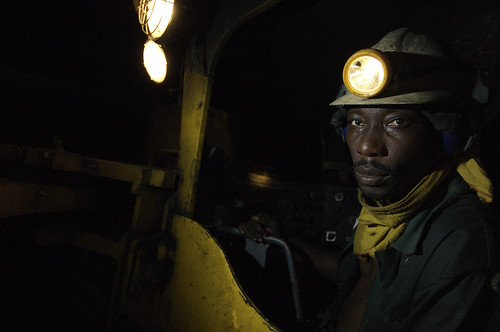
As newly resource-rich countries grapple with how to manage their resources well, questions arise on how governments can channel natural resource revenues into smart investments, as well as lessons learned from past experiences. At a Flagship event preceding the Annual Meetings, panelists came together to discuss “Making Extractives Industries’ Wealth Work for the Poor.”
If managed well, revenue from resources such as oil and gas in Tanzania and Mozambique, iron ore in Guinea, copper in Mongolia, gas and gold in Latin America, oil, gas, bauxite and gold in Central Asia, can contribute to sustainable development. When poorly handled they can present long-term challenges for governments, communities and the environment.
The panelists included Marinke Van Riet, International Director, Publish What You Pay; Ombeni Sefue, Chief Secretary of Government, Tanzania; Samuel Walsh, Chief Executive Officer, Rio Tinto; and Tan Sri Nor Mohamed Yakcop, Deputy Chairman, Nasional Berhad, Malaysia. The session was moderated by renowned energy expert Daniel Yergin, Vice-Chairman, IHS, and bestselling author of The Quest: Energy, Security, and the Remaking of the Modern World.
In her opening remarks, Sri Mulyani Indrawati, Managing Director & Chief Operating Officer, posed the following: “Who is best positioned on how to get it right?” She said that although there were clear rules established by the international community, including establishing Sovereign Wealth Funds, the challenge lay in how to manage those funds. Daniel Yergin corroborated by saying “a new reality informs us” with the loss of revenues and even divestment in many resource-rich nations. Moving past the commodities super cycle in the last decade has led to a renewed thinking on how best to manage resources, especially in Africa.
So how did countries like Malaysia manage their resources through cycles of boom and bust?
Sri Yakcop explained it was engrained in the political philosophy of the nation. Malaysia put in place the twin goals of ending poverty and building shared prosperity back in 1970, and thanks to political will and disciplinary expenditure measures, poverty rates have declined from 49.3% to 1.7%. State-owned oil company Petronas grew and benefited from this philosophy as well. Insulated from political interference, the oil company still reports only to the Prime Minister of Malaysia. “We spend money on future generations today: all resources belong to the federal government with 5% allocated at the state level,” he said.
Marinke Van Riet pointed out that between mandatory disclosure payments, unlocking silos within The EITI Standard, the linkages between the Bank’s Open Contracting movement – intertwined with technical support mechanisms to client countries – as well as a new safeguards policy, the stage to demand for accountability is coming. She challenged Rio Tinto’s CEO and the Tanzanian Chief Secretary on issues of mandatory disclosure payments and having a long-term vision of the country, respectively.
Samuel Walsh emphasized his firm’s investment framework is clear i.e. is in favor of publishing their agreements with governments as “we have nothing to hide,” although they do not publish contracts with their suppliers due to procurement rules. “We don’t own any countries,” he said in humorous reference to relations with the Australian government. Ombeni Sefue seemed inspired by the Malaysian model of growth and concluded it was important to develop a relationship of trust which balances the government’s need for capacity building and the needs of the investing oil company.
Although Sri Mulyani’s initial question went unanswered, it was a rich discussion which left a packed audience thinking more about the challenges in this growing sector and how best to address them.


Join the Conversation